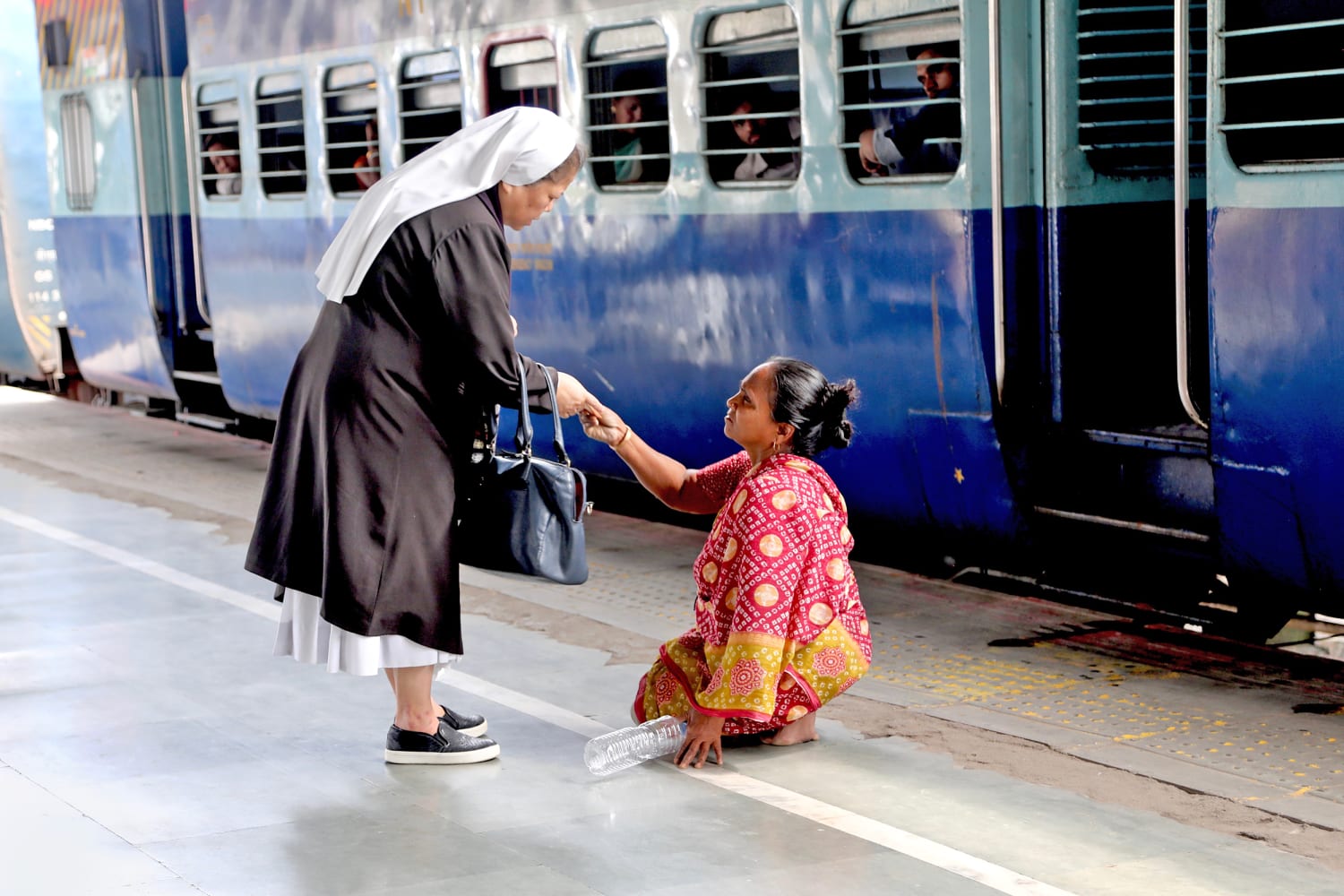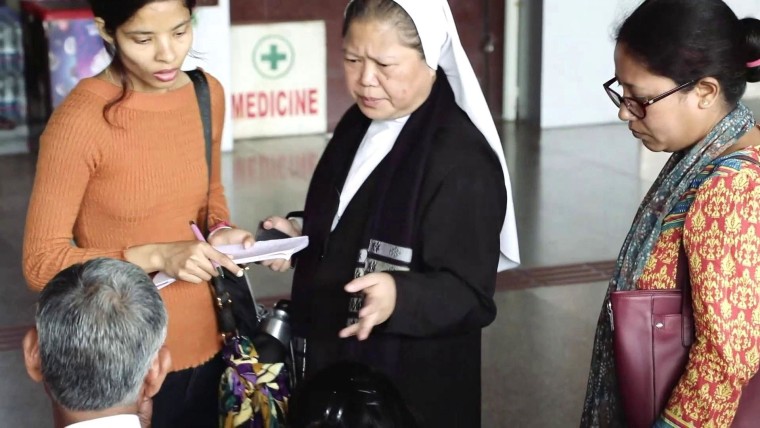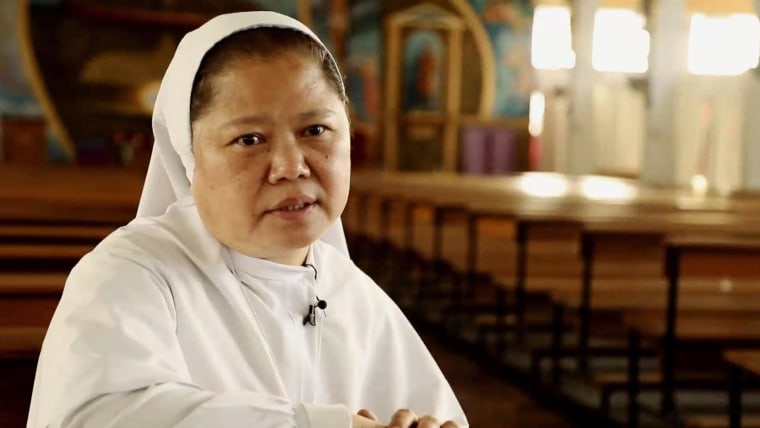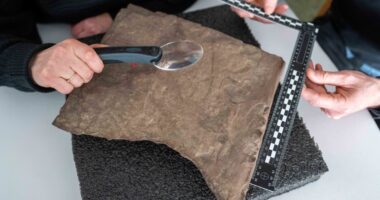GUWAHATI, India — Sister Rose Paite stepped inside this sprawling city’s main train station and scanned the crowd. She often visits public gathering places like this as part of her life’s mission: to save children from being trafficked.
In seconds, Paite was off. She had spotted a situation that alarmed her — a young girl, maybe 15 years old, sitting beside a much older man in a crisp button-down shirt. Paite walked up to them and began asking questions.
Where are you going? How did you meet this man?
The answers confirmed Paite’s suspicion.
The girl said she had just met the man on the train. It wasn’t clear where she was headed next.
Paite, who was wearing a black tunic and white veil, talked to her for nearly four minutes and handed over her card. She wanted to be able to check in on the girl, but the girl refused to give Paite her phone number.
Before walking away, the diminutive Roman Catholic nun warned the man, but she said he was dismissive.
“That girl, truly, will get into trouble,” Paite said. “She is so vulnerable.”
Then Paite skittered off again. The Guwahati train station was busy. There were more children likely to be in danger.
‘Human trafficking is everywhere’
Paite is not a lone crusader. She’s part of a vast but little-known network of Catholic nuns dedicated to fighting human trafficking across the globe. The organization, Talitha Kum, was formed in Rome in 2009 and now operates quietly in 92 countries.
The group is made up of roughly 60,000 religious sisters. The work they do is often dangerous and daring — confronting pimps on darkened streets, patrolling dusty alleys that host brothels. The sisters also operate safe houses in several countries, providing refuge for women and girls fleeing their captors.
Their work doesn’t only take place in the streets. The organization pushes for systemic change, lobbying for stronger laws to combat human trafficking.
“If you want people to understand the urgency of the problem, you can’t be tiptoeing around it,” said Sister Jeanne Christensen, a member of the board of directors of the U.S. Catholic Sisters against Human Trafficking, which works with Talitha Kum.
The scale of the problem is huge: The International Labor Organization estimates that roughly 25 million people are in forced labor across the globe, with nearly 5 million facing forced sexual exploitation. The majority of sexual exploitation victims live in Asia and the Pacific region — about 3.5 million compared to 200,000 in the Americas, according to the latest estimates.
“Human trafficking is everywhere,” Christensen said.
“If you live in a small town in Iowa and there’s a highway going through town,” she added. “Airports. Train depots. Bus depots. Take your pick.”
Leslie King was a 15-year-old runaway from Michigan in the late 1990s when she met an older man who promised to take care of her but turned out to be a pimp. Studies suggest that over 60 percent of those who are trafficked for sex were runaway children, often lured into that life within 72 hours of leaving home.
The pimp and his associates told King that she had better start turning tricks or else.
They “told me if I run, if I tell police, they were going to kill my mother, my son, my sister, my brother,” King recalled. “And cut my body parts up and spread them all across the state of Michigan.”
King began walking up and down Division Avenue in Grand Rapids, hopping in the cars of men offering money for sex. “Every time I got into one of those cars, it was a 50-50 chance I was coming back,” King said.
One woman often showed up on Division and talked to the streetwalkers, King said, though she was clearly not one of them. Her name was Sister Francetta, and she was joined by other Catholic sisters.
“Sister Francetta would come up and down Division trying to pray with the women and talk to the women and assist the women, but I would never talk to her,” King said.
King said she managed to take steps to leave the life after attempting suicide on July 4, 2000. She checked herself into a 30-day drug rehab program. At the start, King said she was told to empty out her purse. To her surprise, at the bottom of the purse was an unfamiliar card.
“From Sister Francetta,” it said. King had no idea how it got in her purse.
The card contained a phone number, which King called. At the completion of her rehab program, she moved into a place called Rose Haven, run by nuns who worked with Sister Francetta.
The experience transformed her life. After graduating from the year-long program at Rose Haven, King joined the staff. She eventually began working for the Grand Rapids Police as a street outreach worker.
“I went back into the street with the same women that I used to get high with — several of us had the same pimp — mentoring and advocating for them,” King said.
King went on to start her own group, Sacred Beginnings, modeled after the program at Rose Haven. She credits Sister Francetta and her fellow nuns with saving her life.
“They’re a very brave bunch,” said King, now 57. “The pimps got to the point with the nuns where they just left them alone. Because nothing you say or do is going to run them away.”
Sister Francetta is now ailing and was unavailable for comment.
The U.S. has seen a sharp decline in women becoming nuns and sisters, leading to a thinning collection of women doing the form of dangerous outreach once done by Sister Francetta.
But in places like India, a small army of sisters carry on the work.
‘How can I get frightened?’
Sister Lourenca Marquesis walking along a dirt path in the coastal state of Goa, a popular tourist destination in western India.
Several years ago, the area was home to a booming sex trade. The warren of concrete huts overlooking the beach were used as brothels, and the men and women who ran them operated with impunity.
Marques said she often visited the area seeking to rescue young girls, an effort fraught with risk.
“We were assaulted by a man over there,” she said, pointing in the direction of a mud-colored house.
The man wrapped his hands around Marques’s neck, she said, and threw her to the ground.
“We were the enemies of what was happening here,” she said.
And yet Marques said the assault didn’t deter her or her fellow sisters.
“How can I get frightened?” she said. “We come here for a specific purpose, to work for these people.”
Marques then walked up to one of the little shacks where the very man she said assaulted her was standing at a sink, washing his hands.
They greeted each other warmly. Marques asked how he was doing and whether she would see him in church on Sunday. The man smiled and nodded his head.
“I love you as if you’re my brother,” Marques told him.
The government bulldozed the area in the mid-2000s. But women and girls remain trapped in sex work elsewhere in Goa and beyond.
Sister Lisa Pires is based in Calangute, a city in Goa that she described as one of the highest trafficked areas in all of Asia.
She may be a woman of the cloth, but Pires operates like a hard-nosed private investigator. She devotes her days to walking the streets of tough neighborhoods and questioning local shop owners and others to help her identify places where trafficking may be occurring. She uses the information to build detailed maps that she shares with police.
“It is very hidden work,” Pires said.
Before leaving the Guwahati train station that day last year, Sister Rose Paite stopped to talk to a group of young people who appeared to be college-age.
They told her they were part of a government training program, which sounded legitimate to Paite. But she handed out her card anyway because of how easy it is to fall into the hands of a trafficker.
“They just follow somebody who invites them with a promise of a job,” Paite said. “And in the process they may be sold to someone else.”
The sisters operate with limited outside support, but groups like the London-based Arise Foundation help to fund their work and also arranged for NBC News to meet with many of the sisters.
They also have the backing of the pope himself.
Pope Francis met with more than 100 members of Talitha Kum at the Vatican last year in part to draw attention to a new fundraising program called Super Nuns. “Problems are best resolved by going out into the streets,” Francis said.
Paite, who is 57 and a breast cancer survivor, has been doing this kind of work for nearly a decade. But she downplayed the role she plays in protecting children.
“I’m a simple nun. A small one,” she said with a laugh.
“I can do very little. Not even a drop in the ocean.”
Source: | This article originally belongs to Nbcnews.com












